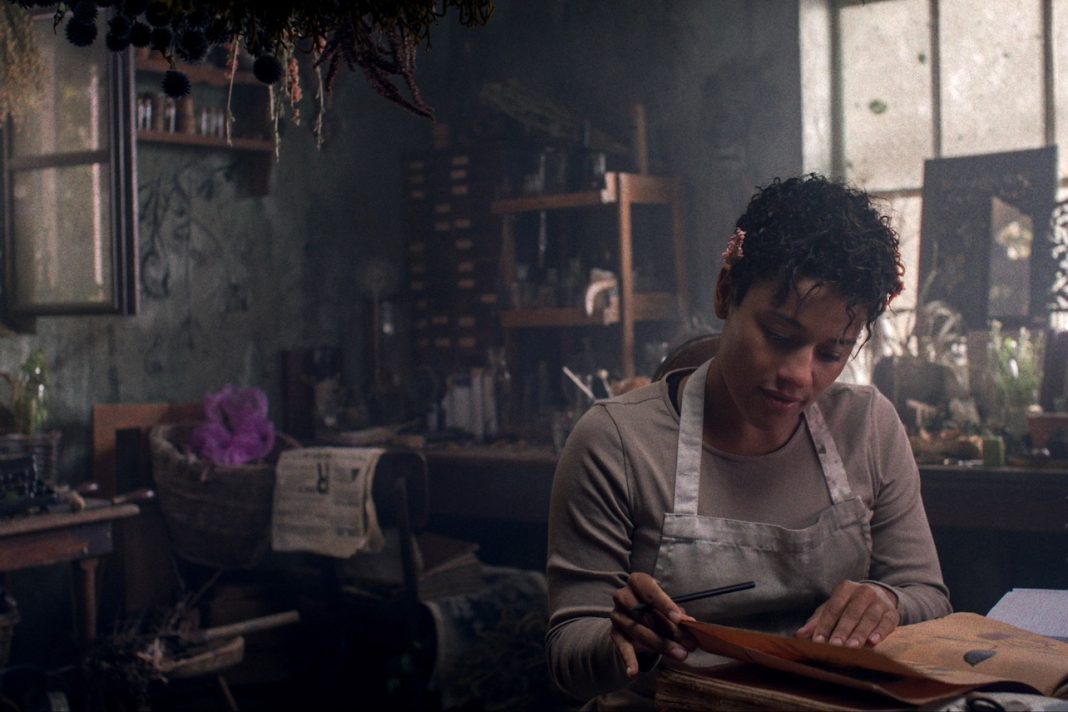If you’re seeking a cinematic experience that blends supernatural elements with a strong feminist message, look no further than “House of Spoils,” the latest offering from Blumhouse Productions. Now streaming on Amazon Prime, this supernatural horror flick showcases the exceptional talent of Oscar-winner Ariana DeBose, who takes center stage as an unnamed protagonist simply referred to as “Chef.”
Directed by the talented duo Bridget Savage Cole and Danielle Krudy, “House of Spoils” is not just another horror film; it’s a narrative steeped in themes of empowerment and the reclamation of feminine energy. Imagine “The Bear,” but with a witchy twist—this film serves up a feast for the senses, albeit with a side of spookiness.
The film opens with a haunting chant, “Feed the soil,” accompanied by eerie visuals of a sickly woman being fed a gruesome concoction. This ominous introduction sets the tone for the layers of mystery that will unfold. As Chef embarks on her journey to launch a new restaurant in a remote location, she faces not only the challenges of culinary excellence but also the supernatural forces tied to her venue. Her old boss, Marcello, warns her that she lacks the qualities necessary to command a kitchen, a sentiment that resonates with many in high-pressure environments. This dynamic reflects a broader critique of the hypermasculine culture often found in professional kitchens, where aggression and dominance overshadow creativity and collaboration.
Upon arriving at the new restaurant, Chef learns that she was a last-minute hire, filling the shoes of the previous high-profile chef, Magnus, who mysteriously quit. The pressure mounts when Chef is tasked with impressing a significant donor with a sample menu. After a disastrous first impression marked by an infestation of bugs and harsh critiques from a food critic, Chef grapples with self-doubt and the haunting legacy of her predecessor.
As she explores the overgrown garden behind the restaurant, Chef discovers an unexpected source of inspiration: a shriveled tomato that, despite its appearance, tantalizes her taste buds. This moment serves as a pivotal turning point, symbolizing the idea that beauty and value often lie beneath the surface—an essential message in a world that frequently dismisses the unconventional. With the help of her sous chef, Lucia, Chef begins to craft a new menu that channels earthy, witchy vibes, ultimately moving away from the rigid, often toxic, standards she inherited.
However, the specter of the witch lingers in the background. As Chef learns more about the property’s history, she uncovers a tale of a coven of women who practiced herbalism and rituals, misunderstood by society as malevolent. This narrative echoes the real-world struggles many women face when embracing their power and wisdom. The film cleverly intertwines Chef’s culinary journey with the witch’s legacy, suggesting that the knowledge women hold—often dismissed or vilified—can be a source of strength and healing.
As the story progresses, the tension escalates when Chef encounters Magnus, now a haggard figure, engaging in self-cannibalism in a moment of sheer horror. This encounter raises unsettling questions about mental health and the pressures that can lead to breakdowns in high-stakes environments. It serves as a stark reminder of the importance of mental wellness in culinary arts, where the demand for perfection can often lead to devastating consequences.
In a climactic twist, Chef’s rejection of the witch’s influence backfires, leading to a disastrous opening night where everything that could go wrong does. Locked away in the wine cellar, Chef stumbles upon the witch’s corpse, triggering a series of revelations about the true nature of the witch’s practices. Rather than malevolent, the witch and her coven were nurturing figures, misunderstood by a society quick to judge. The imagery of women sacrificing for the soil becomes a poignant metaphor for the sacrifices women make for their families, careers, and communities—often without recognition.
In a dramatic finale, Chef emerges from the depths, dirt-streaked and determined to reclaim her narrative. Her transformation culminates in a bonfire feast, where she embraces the very elements she had tried to shun. With this act, she not only salvages her restaurant’s opening but also redefines what success looks like—one that honors the earth and the feminine spirit.
While some might question the film’s realism—can one truly create a five-star meal with little more than a rabbit and foraged ingredients?—the essence of “House of Spoils” transcends culinary logistics. It’s a tale about finding one’s voice, embracing the chaos of creation, and recognizing the power of community. The film ultimately champions the idea that women, when united and in touch with their roots, possess an unparalleled strength that can challenge societal norms and redefine success. So, as you settle in for a weekend of supernatural delights, remember: sometimes, the most potent magic lies in the bonds we forge and the truths we dare to uncover.

